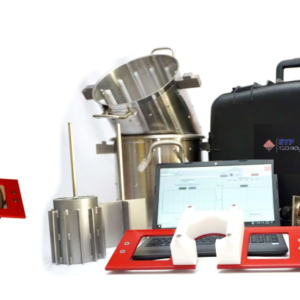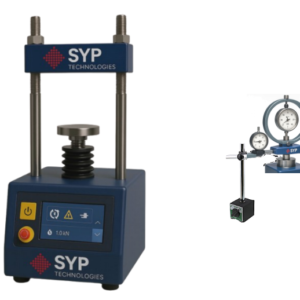Rheometer (Dynamic Shear)
S1-RH-101
- Inductive motor technology
- Precision control of instrument torque, Ultra-low inertia, Electronically Commutated (EC), drag cup motor allows rapid change of torque and speed, as well as access to higher oscillation frequencies without the need of excessive corrections
- Wide continuous torque range facilitates measurement of low-viscosity liquids through to stiff solids without changing test conditions or measuring geometries
- Intelligent motor cooling regulates internal operating temperature according to torque and power demands
- Precision air bearing
- Provides frictionless support between moving parts
- Machined from sintered, porous carbon to provide uniform air distribution with negligible directional bias enabling operational and measurable torques below 1 nNm
- High axial and radial stiffness for increased robustness and reduced compliance
- High precision rotational system
- Accurate measurement of rotor position and speed
- Optical encoder with nanometer resolution for measuring minuscule radial displacements and speeds
- Sample response optimized by locating the sensor as close to the measurement as possible
- High-speed Digital Signal Processor (DSP) provides rapid and accurate direct strain and speed control
For further details, download the complete PDF brochure
Description
A modular rheometer with true plug and play functionality for all measuring systems and environmental
control units – the DSR enables pioneering Standard Operating Procedure (SOP) based
testing with a built-in comprehensive library of standard test protocols for the asphalt industry. Asphalt, or bitumen, is a petroleum product used in the road (pavement), roofing and construction industries. A mixture of aromatic hydrocarbons (varying with geographical source), this black viscoelastic material is considered to be a complex colloidal system.
Asphalt is used as a binder with aggregates in road (pavement) construction and as such determines performance and lifetime. Additives such as polymers, crumb rubber, oils, waxes, phosphates and pH adjusters are used to enhance mechanical properties in modified asphalt binders. Asphalt emulsions are also used as water-proofing and re-surfacing materials. Rheological characterization by Dynamic Shear Rheometers (DSR) is the standard method of classifying asphalt binders for behavior over time and loading conditions, and in different climates.
SPECIFICATION
- Torque range – viscometry (rate and stress control) 1): 100 nNm – 150 mNm
- Torque range – oscillation (strain and stress control) 1):100 nNm – 150 mNm
- Torque resolution: 0.1 nNm
- Position resolution: < 1.8 · 10-9 rad
- Angular velocity range: 10 nrads-1 to 200 rads-1
- Step position control in strain control: < 10 ms
- Frequency range: 6.28 μrads-1 to628 rads-1(1 μHz to 100 Hz)
- Motor inertia: 12 μN.m.s2
- Normal force range: 0.01 N – 20 N
- Normal force resolution : 0.5 mN
- Normal force response time: <10 ms
- Vertical lift speed: 0.1 μms-1 to 20 mms-1
- Vertical lift range (measurable): 230 mm
- Gap resolution (over full vertical lift range): 0.1 μm
- Fully configurable vertical profiles: By speed and by Normal Force
- Raw instrument variables: 5 kHz constant streaming data
- Complete sample history: Data available from loading to unloading as standard
- Instrument interface: USB2 – plug and play
DIMENSIONS
- L x W xH: (0.5 x 0.5 x 0.7) m






Leave a Reply